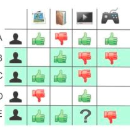Recently, there has been an increasing adoption of differential privacy guided algorithms for privacy-preserving machine learning tasks. However, the use of such algorithms comes with trade-offs in terms of algorithmic fairness, which has been widely acknowledged. Specifically, we have empirically observed that the classical collaborative filtering method, trained by differentially private stochastic gradient descent (DP-SGD), results in a disparate impact on user groups with respect to different user engagement levels. This, in turn, causes the original unfair model to become even more biased against inactive users. To address the above issues, we propose \textbf{DP-Fair}, a two-stage framework for collaborative filtering based algorithms. Specifically, it combines differential privacy mechanisms with fairness constraints to protect user privacy while ensuring fair recommendations. The experimental results, based on Amazon datasets, and user history logs collected from Etsy, one of the largest e-commerce platforms, demonstrate that our proposed method exhibits superior performance in terms of both overall accuracy and user group fairness on both shallow and deep recommendation models compared to vanilla DP-SGD.
翻译:近年来,差分隐私 (Differential Privacy) 引导的算法在保证隐私的机器学习任务中得到了越来越多的应用。但是,这些算法的使用会带来算法公平性的权衡,这一点已经被广泛承认。特别地,我们已经实证发现,利用差分隐私随机梯度下降(DP-SGD)过程中训练的传统协同过滤方法在不同的用户参与层次下会造成不公平现象。这反过来导致原有的不公平模型对不活跃用户的偏见更为严重。为了解决上述问题,我们提出了 DP-Fair,这是一种基于协同过滤算法的两阶段框架,它将差分隐私机制与公平性约束相结合,在保护用户隐私的同时确保公平推荐。基于 Amazon 数据集和 Etsy 收集的用户历史日志,我们的实验结果表明,在浅层和深度的推荐模型中,与原始的 DP-SGD 相比,我们提出的方法在整体准确性和用户群体公平方面都表现出更优秀的性能。





